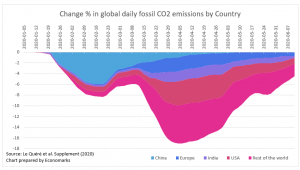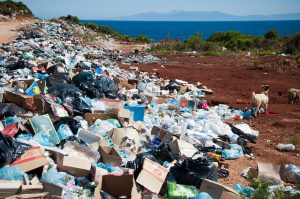We’ve all been encouraged by the reduction in air pollution in different cities around the world during shutdowns created by the COVID-19 pandemic. The COVID-19 shutdowns are not over but restrictions are being lifted and it is time to recheck carbon emission levels.
A supplementary study for work originally published in Nature Climate Change tracking the Temporary reduction in daily global CO2 emissions during the COVID-19 forced confinement shows that the daily global CO2 emissions during the lockdown were reduced but are now surging back up as restrictions are lifted. Most of the dip to the emissions is attributed to transportation as people stayed in one place and surface transportation as well as aviation came to an almost complete stop.
The data shows that in early April 2020, daily global CO2 emissions decreased by –17% (–11 to –25% for ±1σ) compared with the mean 2019 levels, with just under half of this total change occurring due to changes in surface transport.
In June 2020, emissions were back to 5% of the 2019 mean and the final percentage will be known based on the continued confinement in different parts of the world.
Because of the pandemic, many people are choosing or being encouraged by local policies to use their own cars and drive solo rather than carpool or use public transport so that transportation emissions will rise in the near future. We will have to wait and see by how much.
See chart for current percentage change up to early June 2020
Source:
Le Quéré, C., Jackson, R., Jones, M., Smith, A., Abernethy, S., Andrew, R., De-Gol, A., Shan, Y., Canadell, J., Friedlingstein, P., Creutzig, F., & Peters, G. (2020). Supplementary data to: Le Quéré et al (2020), Temporary reduction in daily global CO2 emissions during the COVID-19 forced confinement (Version 1.0). Global Carbon Project.





